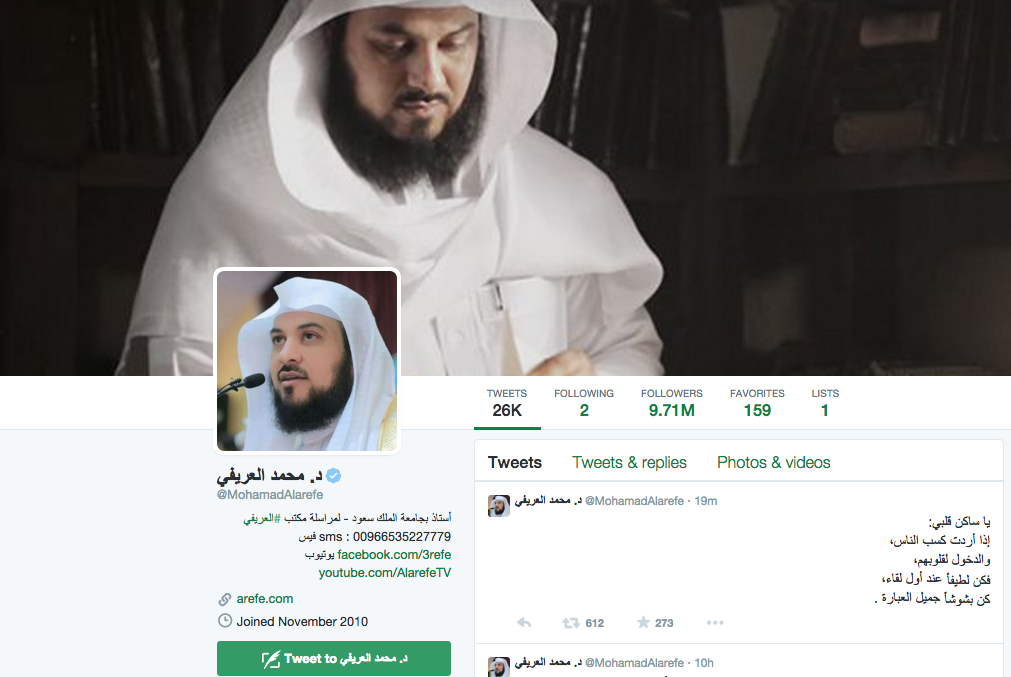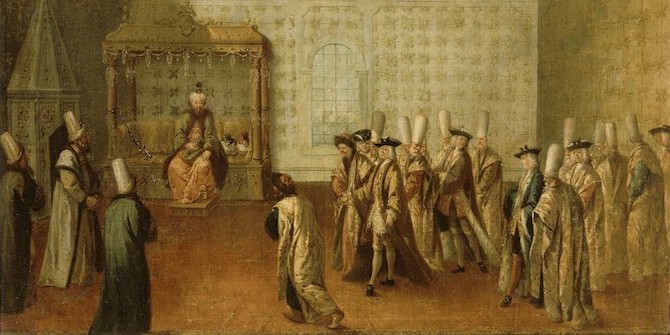by Dr Mohammed Ibahrine

Just as in other regions, countries with a Muslim majority have witnessed a rapid diffusion and adoption of social media platforms such as Facebook, Twitter and YouTube in recent times. In the Arab World, Facebook is still the leading social networking website with 81,302,064 users. Twitter follows with 5,797,500 users (Arab Social Media Report, 2014). The Arab Region is only second to the USA when it comes to the number of daily YouTube views. With 90 Million video views per day, Saudi Arabia has the world highest number of YouTube views per Internet user (Arab news, 2014).
The popularity of social media platforms in the Arab World has led some scholars to expect its impact on religious life to rise. The common argument is that social media has the potential to change people’s religiosity and practices of piety. The impact of social media on religious behaviours of individuals and communities in environments characterised by conservatism and traditionalism, it is argued, will be more profound than in environments characterised by liberalism and openness.
Communicating and winning the hearts and minds of believers and non-believers through da’wa is a central commitment for many Muslims and Islamic leaders. Today, social media has become an invaluable means to pursue the path of da’wa and the dissemination of the Muslim thoughts. Only very few voices condemn the use of the new digital media as incompatible with Islamic practices. For instance, Abdul Aziz Al Shaikh, Grand Mufti in Saudi Arabia, advances a critical stance towards social media platforms such as Facebook and Twitter because, as he says, they disseminate lies and may destroy established relationships in the real world. In a similar line, religious authorities in some Islamic countries issued fatwas against the use of social media like Twitter, arguing for its incompatibility with shari’a because of trading accusations and promoting lies.
While some of the Islamic religious leaders advise their followers not to use social media platforms, the overwhelming majority of scholars and preachers capitalise on the effectiveness and efficiency of social media in engaging with the community of believers and enhance their fidelity and loyalty.
During the first generation of the Internet, there were some traditional websites like Islam Online that acted as a one stop-shop for religious information and comprehensive services to the Islamic ummah.
The mushrooming of digital platforms during the second era of the Internet led to a process of undermining the monopolistic nature of religious orthodoxies. For many, social media became an ideal platform, the new Mosque or madrasa, for the dissemination of the Islamic belief. These digital platforms led to the emergence of what some call “Facebook fatwas”. F-Fatwas introduced a new paradigm to the practice of religious instructions in the way they were formulated, issued, disseminated, received and acted upon. F-Fatwas sparked commentary and feedback among many sectors of Muslim societies, including religious authorities, Islamist intellectuals as well as young urban or secularised Muslims.
One type of Islamic use of social media platforms is proselytisation, which is widely popular amongst Islamic preachers. Mohammad Al-Arifi topped the list with nine million followers, second is Aid al-Qarni with seven million, followed by Ahammad al-Shugairi with six million (Twitter, 2014). Ironically enough, some deceased religious scholars have social media accounts in their names set up by their religious and intellectual followers in order to reach the younger generations.
The use of social media is not limited to religious leaders. Regular Muslims also tweet Qur’anic verses and hadith (prophetic sayings). The dissemination of religious content regularly reaches its peak during the ‘Ramadan Aperture’, when Muslims are internally and externally motivated to receive and process religious content in form of tweets. This new phenomenon changes the way the Islamic faith is promoted among believers and non-believers alike. Also, on the occasion of Hajj, the pilgrimage to Mecca, some pilgrims tweet feeds and upload photos and clips offering a sense of virtual spirituality to their families. These practices contribute to the enhancement of co-religiousness and co-piety of the Islamic ummah.
All these practices indicate that social media is integrated in the habit of spreading the word of Allah and safeguarding Islam against critics from outside. Social media also created an Islamic popular diplomacy. This involves the global mobilisation of believers through virtual platforms, in case of individual or group attacks on the prophet or the Quran. Prominent examples are the videos of an American pastor planning to burn copies of the Quran in 2010 and the anti-Islam clip ‘Innocence of Muslims’. These videos have triggered a global mobilisation of Muslims protests on social media platforms. Countries such as Pakistan, Jordan and Egypt even requested from YouTube to delete the films.
Some conservative leaders called for the creation and launch of shari’a compliant halal social media platforms. As a response to these calls, a number of digital initiatives and projects were carried out. Islam-centered alternatives to Facebook such as Muslimsocial.com, Muxlim.com and SalamWorld started to appear; yet their adoption rate is still very low.
Social media has also opened up the opportunity, especially for young Muslims, to engage with their faith and their peers in a way their parents could never have imagined. Where once the ummah was a spiritual notion, with Muslim communities separated by language and geography, social media has broken barriers and enabled young Muslims to connect irrespective of where they are. It allows them to discuss what it means to be Muslim in the twenty first century, especially for those living in the West.
For some digital activists, social media provides the means for re-uniting the ummah in a form of e-ummah. Digital social platforms, they think, can contribute to the creation of virtual communities that may pave the way for eventual physical communities. Social media can hence support the global cohesion of believers by weaving links between community members worldwide. In some urban centers in North America and Western Europe, Islamic social media websites have contributed to the spread of Islamic icons and symbols among the members of the Muslim diaspora. Recent research has shown that young Muslims in Western societies are more receptive to religious beliefs and values and that Islam plays a key role in forming their identities (Choudhury, 2007). One indication of their religiosity is that they are likely to attend mosques more frequently.
In Europe and the United States, Islamic proselytising efforts have been exceptionally successful; with non-Muslims accepting invitations to convert to Islam. The personal videos of converters are even broadcasted on YouTube and discussed in virtual chat rooms.
The recent return and rise of Islam is spectacular. It has been argued that synergy of small media and social media have helped Islam to gain or regain a place in our contemporary social life. The continuous digitisation of Islam, or the Islamisation of the digital world, represent a challenge to the religion of Islam in the twenty first century, where closed systems are resisting the openness of instantly constant transparency and wikileaks effects.
For centuries, interpretations of the Quran were kept a reserved domain for a small minority of ulama (scholars of religion). Social networking websites have become avenues for disseminating sacred interpretations, sometimes undermining traditional religious authorities. The blossoming of digital fatwas is also an indication of the splintering of orthodoxies and the emergence of heresies. Consequently, religious authority has become a contested domain, rather than an accepted reality by the uneducated masses. Social media may fade out, yet the process of digitalisation of Islam or Islamisation of digital is here to stay.
Further Readings
Bunt, G. iMuslims: Rewiring the House of Islam. Chapel Hill: University of North Carolina Press, 2009.
Choudhury. T. The Role of Muslim Identity Politics in Radicalisation, the Department for Communities and Local Government, (2007)
Dubai School of Government, “Arab Social Media Report.” http://www.arabsocialmediareport.com (Accessed October 2014).
Khan, F. “90 million videos viewed daily on YouTube in KSA.” http://www.arabnews.com/news/536196 (Accessed October 2014).
Howard, P. The Digital Origins of Dictatorship and Democracy: Information Technology and Political Islam. Oxford: Oxford University Press, 2010.
 Dr Mohammed Ibahrine is Associate Professor of Mass Communication at the American University of Sharjah. He was Visiting Fellow at the MEC in the summer of 2014. While based at the Centre, he worked on his upcoming book on digital communication and socio-political change in the Arab world.
Dr Mohammed Ibahrine is Associate Professor of Mass Communication at the American University of Sharjah. He was Visiting Fellow at the MEC in the summer of 2014. While based at the Centre, he worked on his upcoming book on digital communication and socio-political change in the Arab world.






This is an awesome article, Given such an extraordinary measure of data in it
Mashallah very nice love your article
One should know about the knowledge of the Quran to live life according to Islam properly.
WOW!! Great article, It was very helpful, I found some extra information at <a href="almuslimquran.com l It Is also a great blog for Learning SEO
A beautiful and very important message Alhamdulillah. May Allah reward you for you hard work and give barakah to your beneficial talk. Ameen
Asalam alaukum rahmatullah barketu, i am an indian muslim and small business all my business was closed last year due to corona virus epidemic, i can’t start business again due to lack of money I applied to the government for financial help and loan but they did not cooperate. Since I am a Muslim, I am applying for business loan from your company. My humble request and request is that I arrange business loan from your bank. Then I will be very much benefited, I am the sole breadwinner of my family, my family is dependent on my income, if I do not do business or I can not earn income my family will die without food, God willing I can get the loan I can. And my family will survive, my name is “Syed Mohammad Ali, Village – Haiderpur, Post Office – Manda, Police – Baduria, West Bengal, India, Mobile Phone Number – +919434620310,
Great blog post,Thanks for providing us this great knowledge,Keep it up.
musailma kazab
You there, this is really good post here. Thanks for taking the time to post such valuable information. Quality content is what always gets the visitors coming.
The Darood Tanjeena is such a powerful Darood Shareef with numerous blessings upon the believer, the Darood Tanjeena benefits are
Such a great information. This is really very helpful for bloggers
There are other bad aspects of the internet. May Allah protect us. Amen.
International Quran Academy
one of best and important site thanks for sharing us
online hifz ul quran course free
As-Salam-u-Alaikum wa -Rahmatullah My dear Muslim brothers & sister My Name is Asif Sayed i am born & brought up in India. Working with a Tax firm in India. With my salary & saving i built one Mosque India Uttar Pradesh in Fathepur district. From last 5 years by the grace of Allah SWT i was taking care of the mosque. But current scenario its been difficult for me take care of the expenses..In that mosque 25 boys are doing Quran Hibs by the grace of Allah SWT i was taking care of them too..with the current scenario COVID 19 i am at home with Leave without pay..My small request for All muslim brothers & sisters if you want to do ant charity in the name of Allah plz feel free to contact me 00919930033446.
Facebook -https://www.facebook.com/sayed.asif.7
Account Holder: ASIF AHMAD SAYED
Account Number: 50100045508793
IFSC: HDFC0000086
Branch: ANDHERI EAST VISHAL HALL
Asif Sayed
As-Salam-u-Alaikum wa -Rahmatullah My dear Muslim brothers & sister My Name is Asif Sayed i am born & brought up in India. Working with a Tax firm in India. With my salary & saving i built one Mosque India Uttar Pradesh in Fathepur district. From last 5 years by the grace of Allah SWT i was taking care of the mosque. But current scenario its been difficult for me take care of the expenses..In that mosque 25 boys are doing Quran Hibs by the grace of Allah SWT i was taking care of them too..with the current scenario COVID 19 i am at home with Leave without pay..My small request for All muslim brothers & sisters if you want to do ant charity in the name of Allah plz feel free to contact me 00919930033446.
Facebook -https://www.facebook.com/sayed.asif.7
My family members always say that I aam killing my time here at net, butt I know I am getting familiarity
every day by reading such fastidioous articles.
Islam is a complete course of Life. It has solutions for every problem or queries of a human being.
Mashallah very nice love your article from Pakistan